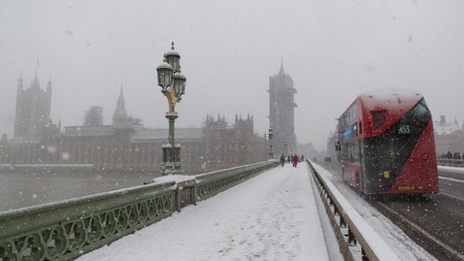UK Weather: Snow and ice warnings extended to more parts of UK
- Published
Weather for the Week Ahead
Warnings of snow and ice have been extended to many parts of the UK over the coming days.
Yellow weather warnings remain in place for parts of north-east Scotland and England until Wednesday morning.
The Met Office issued a slew of further yellow warnings on Monday which cover much of the UK during the next five days.
Heavy snow could bring "significant disruption" to northern and central parts on Thursday and Friday, it said.
Forecasters say a "major change" is under way as Arctic air sweeps in from the north, bringing snow, ice and plunging temperatures for many.
A fresh warning of ice and some snow across areas of the Midlands, East, south of England and Wales comes into force between 21:00 GMT tonight and 10:00 on Tuesday.
This could lead to "difficult travel conditions" in some parts, the Met Office said.
Some roads and railways were likely to be affected in these areas, it said, and people should expect longer journey times.
A similar warning covering much of Northern Ireland is also in place overnight.
Snow is likely to cause some travel disruption across parts of southern England and Wales throughout Wednesday, according to another warning.
Further warnings for heavy snow are in place for Thursday and Friday in much of Scotland, northern England, parts of the Midlands, north Wales and Northern Ireland.
Weather conditions may disrupt travel and other day-to-day activities, with more alerts likely to be issued.
The first Met Office warning began on Sunday evening for parts of Scotland, covering places including Aberdeen and Dundee, the Highlands, Orkney and Shetland.
The warning, external in place on Monday encompasses more of Scotland and a corridor of north-east England that extends to Newcastle upon Tyne and Yorkshire.
For Tuesday, external, the area grows further to cover Strathclyde, more of Yorkshire and the Humber, and the East Midlands.
Frequent snow is expected, with northern Scotland experiencing frequent and often heavy snow showers on Monday afternoon.
The Met Office said snow could cause delays on roads in these places, as well as rail and plane cancellations. It also warned of the risk of slips and falls on icy surfaces.
There was "slight chance" that rural communities could be cut off, it said, adding that cuts to power and phone services were possible.
Tuesday night may prove to be the coldest of the year so far, when the temperatures could fall as low as -15C in some sheltered Scottish glens.
Some uncertainty surrounds Wednesday, when a "battleground" is expected to be set up as milder Atlantic air from the south meets colder Arctic air from the north.
BBC forecaster John Hutchinson said it would be "a very cold start to March", with many areas likely to see snow at some point.
In some areas, this may only but a small amount, with the heaviest snowfall likely to be in northern Scotland over the next few days, he added.
On Thursday and Friday, he said snow may become "a bit more widespread in central and northern Britain" and flurries may be "fairly persistent".
There could be drifting and some disruption to travel and power, he added.
The UK Health Security Agency (UKHSA) has extended its level three cold weather alert to all of England, with the warning in place from 01:00 on Monday to midnight on Thursday.
This means there is a 90% chance of severe cold weather, icy conditions or heavy snow.
The agency said this could have a "serious impact" on the health of those who are vulnerable to cold weather, and urged people to check on relatives.
It advised over-65s, or those with pre-existing medical conditions, to heat their homes to at least 18C.

How is the cold weather affecting you? Share your experiences by emailing haveyoursay@bbc.co.uk, external.
Please include a contact number if you are willing to speak to a BBC journalist. You can also get in touch in the following ways:
WhatsApp: +44 7756 165803
Tweet: @BBC_HaveYourSay, external
Please read our terms & conditions and privacy policy
If you are reading this page and can't see the form you will need to visit the mobile version of the BBC website to submit your question or comment or you can email us at HaveYourSay@bbc.co.uk, external. Please include your name, age and location with any submission.
Related topics
- Attribution
- Published3 March 2023
